School teacher and science educator, a new team for teaching in France
- Last Updated: Tuesday, 27 July 2021 12:38
- Published: Thursday, 03 April 2014 07:10
- Written by Jean-Olivier Gransard-Desmond translated by Margarida Ataide, Yassamin Kouraichi, Christiane Angibous-Esnault
- Hits: 1216
The development of educational or school rhythms is constantly in the news. It is true that it is difficult for both parents and teachers to find their way through the information relayed by the media. This article is a reaction to the special issue "Rythmes scolaires, et si ça marchait ?" (School Rhythms, what if it worked?) of Télérama no. 3341 of January 22, 2014 (French revue).
The Organization of Educational Rhythms, a different learning time from school in France
In one of the articles of Télérama dossier about the new School Rhythms, Marc Belpois wrote:
Elementary school [teachers] [have the right to object] when, at the end of the day, an introduction to Chinese exhausts children who are supposed to be resting their brain cells.
What an error in judgment as to that end of the sentence! However, Marc Belpois mentions at the beginning of the file that the reorganization of school time is intended to better distribute academic learning time to facilitate children's learning process. The 3 hours of freed up time is therefore not intended to be rest time or childcare, but rather a different time where children can have access to artistic, cultural and sports activities approached in a different way than at school.
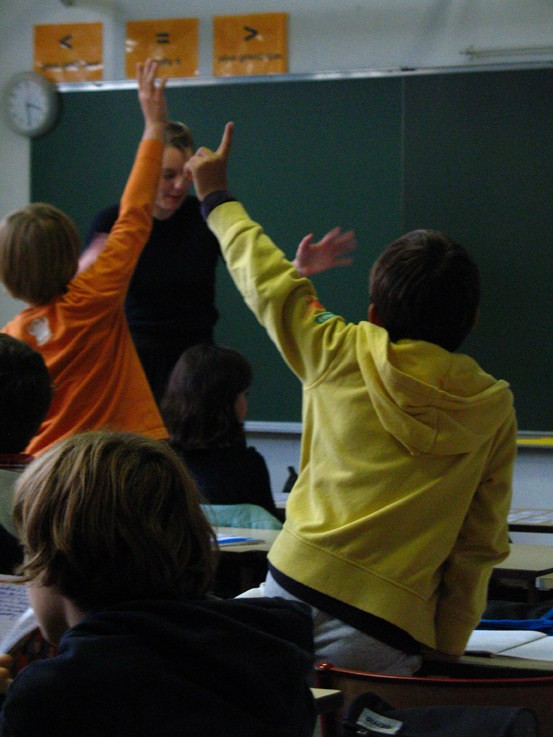 |
|
| Julia Schelling, ArkeoTopia science ambassador, working on Egyptian jewelry at the Corbon school, Paris 15th. © ArkeoTopia - Beauchef G., 2014 |
As the term "culture" is a broad one, it should be remembered that its reality includes scientific culture as well as technical, literary, artistic culture, etc. This is why, within ArkeoTopia, we have proposed a science workshop. However, science workshop requires reflection. Far from simple play and discovery through a story, we actively involve children and therefore challenge their brains. No science workshop worthy of the name can claim to rest the brains of our beloved schoolchildren. The science ambassador, the science educator or the organization that would say or write the opposite would have questions about the quality of its so-called science workshop. Of course, we are talking about child-friendly thinking, not "skull stuffing" or competing for results.
An other vision of the reOrganization of Educational Rhythms
ArkeoTopia is not the only partner of the Paris City Council to have this vision for a different learning experience and not a resting time. Many other associative partners echoed this vision during the briefing of Reorganization of Educational Rhythms' (RER) partner associations for the Paris City Council on 7th February 2014. This year, 550 non profit organisations are running 5000 workshops every week.
This is also the vision of the Paris City Council, as evidenced by the Projet Éducatif Territorial - PEDT (Paris Territorial Educational Programme - PTEP) and the themes of the RER workshops. Signed by the Rector's office, the City hall, the Prefecture and the Paris family allowance Fund, the PTEP has five objectives:
- To contribute to the educational success and fulfilled of every young Parisian
- To promote socialization and the acquisition of autonomy
- To promote equal rights
- To strengthen the educational coherence between school projects on one hand and peri- and extra-curricular projects on the other hand
- Involving and accompanying parents, supporting families in the conciliation of their professional, family and social lives.
As for the RER's themes, they cover sports, artistic and relaxation activities as well as themes linked to memory, within which archaeology is included, or even learning to be independent and live together. There are many other themes relating to health, intergenerational issues, earth protection, etc. The quarterly rotation of the workshops allows for different levels of reflection and for children to build personal paths that are differentiated according to their areas of interest.
 |
|
| A riddle in French to discover the object of study of archaeology © ArkeoTopia - Gransard-Desmond J.-O., 2010 |
Not all RER workshops are therefore intended to be a time of neuronal fallow for children. At ArkeoTopia, an alternative approach to archaeology, we aim to make them aware of scientific and technical culture (e.g. understanding the difference between researcher and craftsman or basic research and engineering), the jobs in History - which includes archaeology, history, ethnology, etc. - and to the disciplines themselves in their scientific dimension, to living together and looking at different cultures according to the themes. This is how the children discovered, this year 2013-2014, Egypt in the time of the Pharaohs through jewelry and France in the time of the Gauls through metallurgy.
Kids developmental psychology to the service of learning
How can we do this with children so young and a mix of ages from 6 to 11? By conducting abroad follow-up, setting the context, advancing step-by-step thinking, using games to fix attention span, and including manual activities. For example, the Celtic theme is enriched by the making of a sword and the ancient Egyptian theme by the making of a bracelet.
Thanks to a simulation, the children discover the reality of the archaeological discipline in relation to paleontology and other scientific disciplines. They also discover the difference between a craftsman and a scientist. They develop their critical thinking skills. They learn to play together and thus learn to respect each other while taking advantage of their strengths for team building. In other words, they discover the world and learn to think. They develop their sense of initiative and, above all, they understand and are interested in what they are doing.
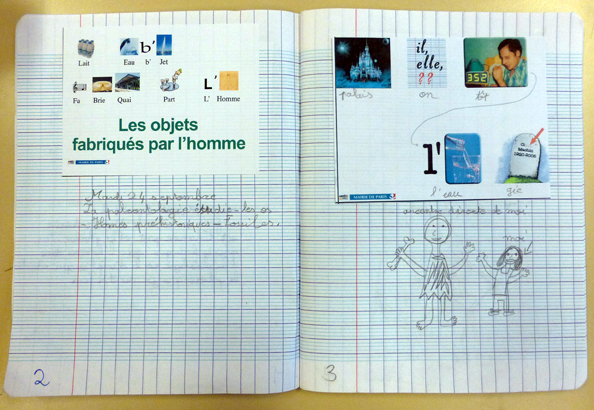 |
|
| The scientist's notebook to keep a souvenir and have fun at home with your parents. © ArkeoTopia - Gransard-Desmond J.-O., 2013 |
That is why, when we read: "Yes, yes, they're at school. But without notebooks or school bags" (Télérama no. 3341, p. 26), we react. If this is the reality in Chambray-les-Tours, where the report took place, it is not the request of most of the speakers at the information meeting on February 7th. Whether for artistic activities (pencil, ruler, eraser, etc.) or for animations like those of ArkeoTopia, the children need at least their kits but also their notebooks so that we can be in contact with the parents.
Similarly, when Juliette Bénabent points out that "pupils distinguish between school time and workshop time" on the basis that one learns things without thinking too much (Télérama no. 3341, p. 26), there is a red herring. Of course, teaching is not in the same form as the academic school. Nevertheless, it is still a lesson for a number of our partners in the scientific animation On the trail of the Human Beings... In fact, not only must the children be able to listen to the instructions, but we also ask them to reflect so that they can understand and transform this listening to construct their thinking and to be able to carry out the manual activity correctly. This is necessary so that each child can, for example, make his or her own Celtic sword or Egyptian bracelet.
Science workshops, an other way to learn reading/writing through archaeology
As you will have understood, if it is not a school time in the classical sense, our scientific activities as well as the interventions of many other partner associations of the City of Paris are not to be considered as a time of day care as we expressed it at the meeting of February 7th. This reminder was also appreciated by the city's representatives, Hélène Mathieu (Director of School Affairs) and Régine Hatchondo (Director of Cultural Affairs).
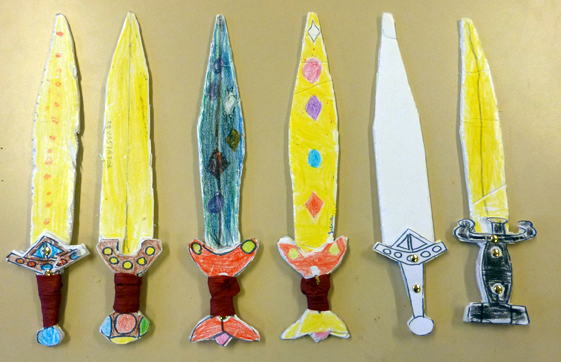 |
|
| The result of the children's craft production and learning about stylistic dating: from the Bronze Age to the Iron Age. © ArkeoTopia - Gransard-Desmond J.-O., 2014 |
Generally speaking, our role is to help children who choose to stay after school, as well as those who cannot be looked after by their parents, to discover both the joys and the difficulties that await them if they decide to join an archaeological association, the conservatory or a sports club. It is not with a workshop of 1h30 per week over one term that they will be able to become small budding archaeologists. At least they will be able to sufficiently assess their interest in the chosen discipline if they want to go further. They will already be armed to choose to register knowingly within ArkéoTopia or another archaeology association in order to follow year-round activities that will allow them to deepen what they will have approached during the RER workshops.
In the framework of the RER, what is discussed and what your children discover with the workshop On the trail of Human Beings..., it is a logical extension of understanding life. After reviewing a bit of geography and chronology to place in space and time the civilization with which they are going to play an archaeologist, the scientific animators lead them to ask themselves questions, to learn to coordinate their movements, to learn to live with the other by confronting different points of view or by coordinating their efforts to obtain a result, to discover one of the tools of archaeology: the chain of operations and thus to better understand how our society today uses raw materials to transform them into objects of everyday life and then discard them (obvious link with recycling and sustainable development).
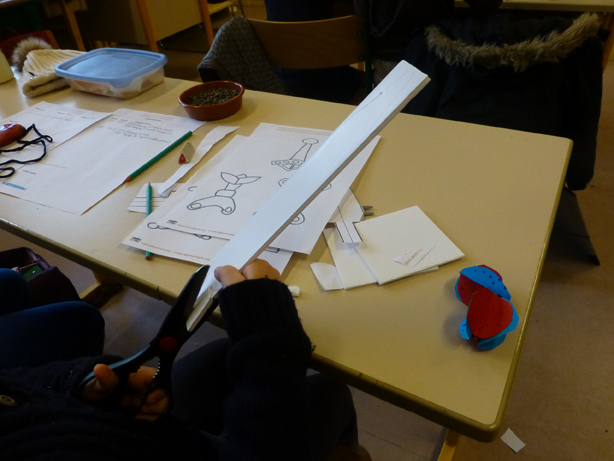 |
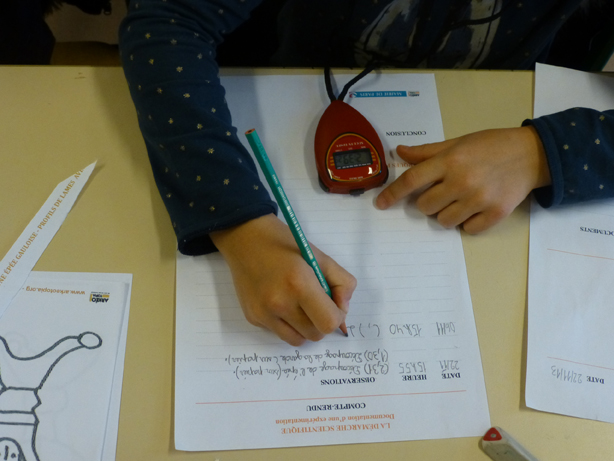 |
|
| While the craftsman is assembling different parts to make a sword… (production) |
the archaeologist observes it and time it to understand the stages of manufacture (chaîne opératoire) |
Of course, we do this by using colorful documents, with games such as riddles and memory or by challenging ourselves. However, children also must write and draw, use a stopwatch, and try to understand what they are doing. Unlike the school, we do not ask them what they did or did not learn and we do not give them marks because that is not our goal. But we seek to ensure that their understanding of the subject allows them to move forward and awaken their interest so that they establish themselves as active individuals in this learning process.
To conclude
While it is certain that the various players must work together to avoid proposing inappropriate times or places, it is essential to understand that leisure, cultural, and scientific activities sometimes have different or even opposing objectives, but that in all cases, the involvement of the child, and therefore his or her reflection, cannot be limited to a single activity.
To go further
- the Organization of educational rhythms in Paris, go to the OER special page on paris.fr, especially the Report on the new evaluation of the Organization of Educational Rhythms (in French), April 2016
- the science workshops on archaeology by ArkeoTopia, go to the ArkaeoKids section
- the Organization of Educational Rhythms (in French) on the Ministry of National Education website
- the Organization of Educational Rhythms thanks to Wikipedia on the entry law of orientation and programming for the refoundation of the school of the Republic (in French)
Unless otherwise stated, the photographs are by © ArkeoTopia, November 2013 (Gransard-Desmond, J.-O.) and December 2013 (Schmidt, Ch.)






